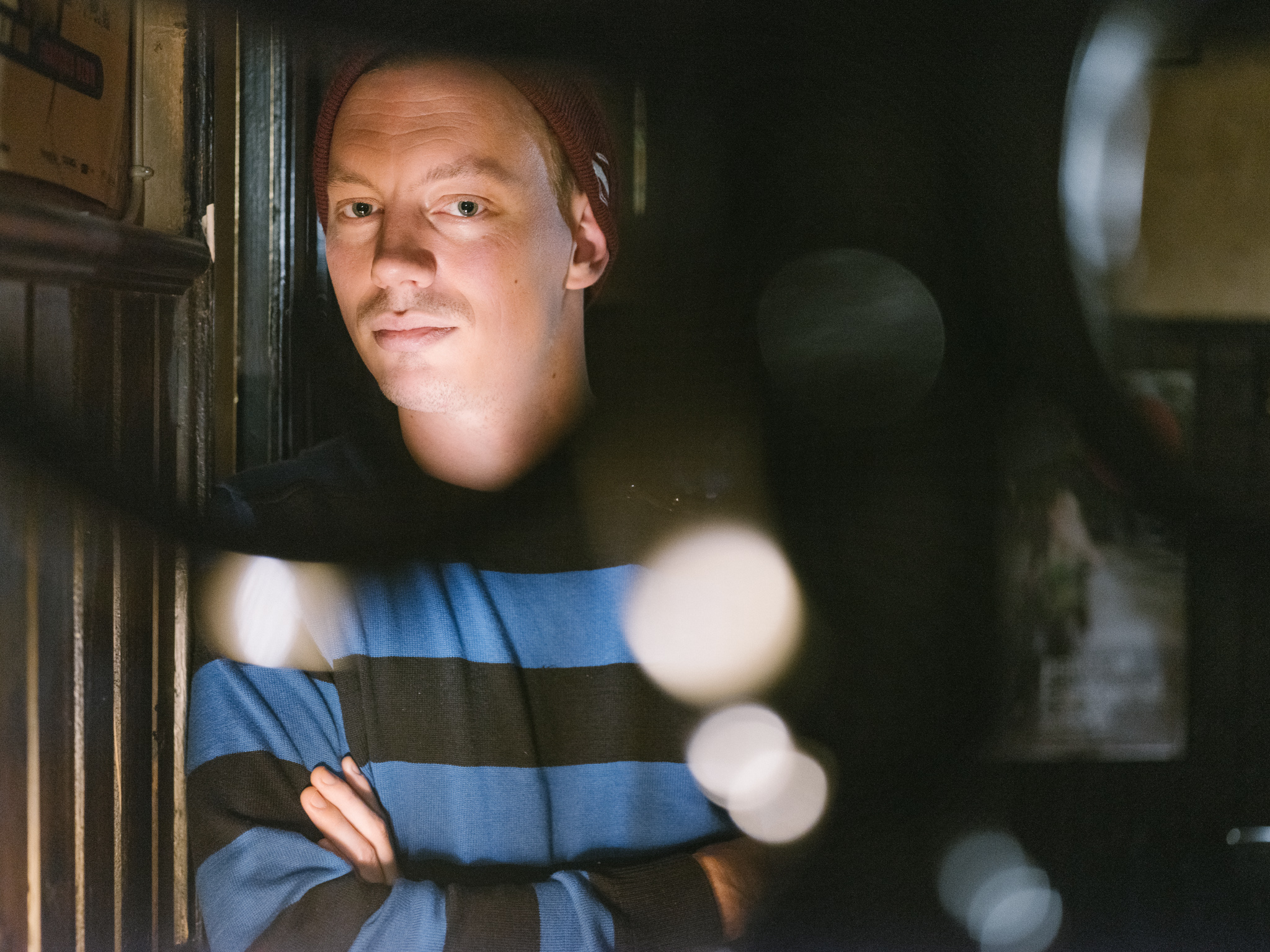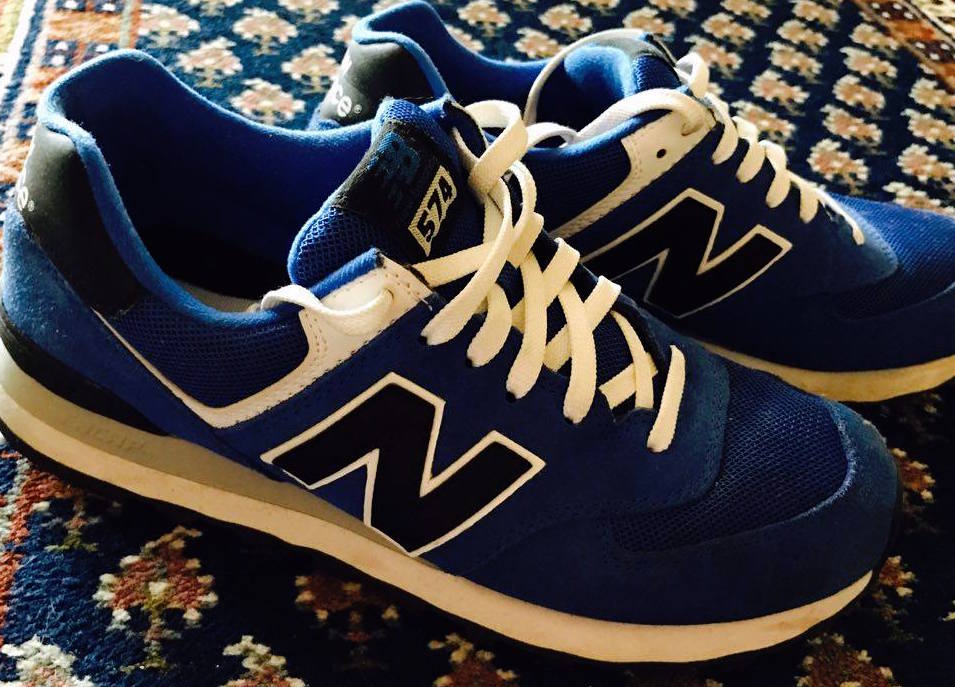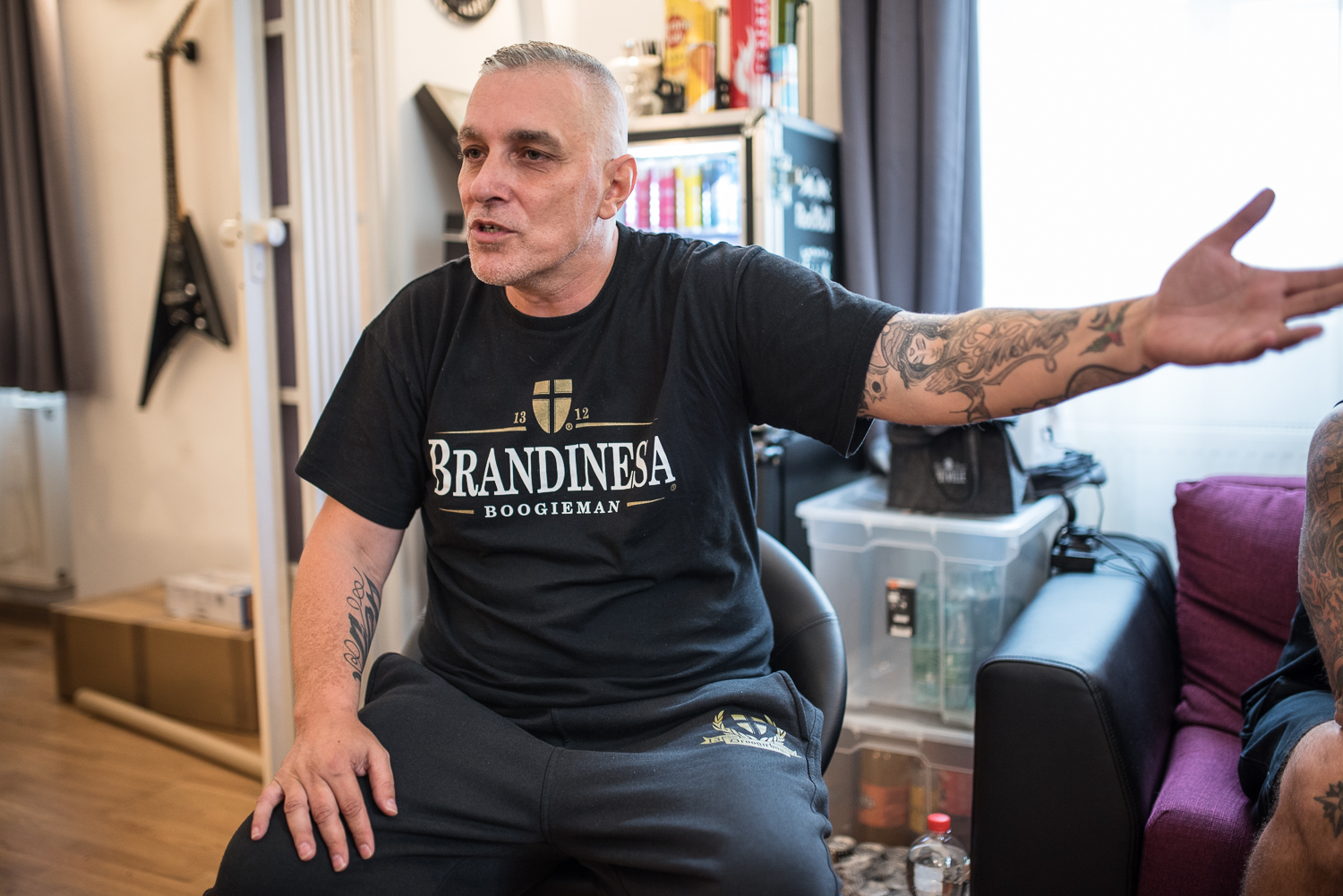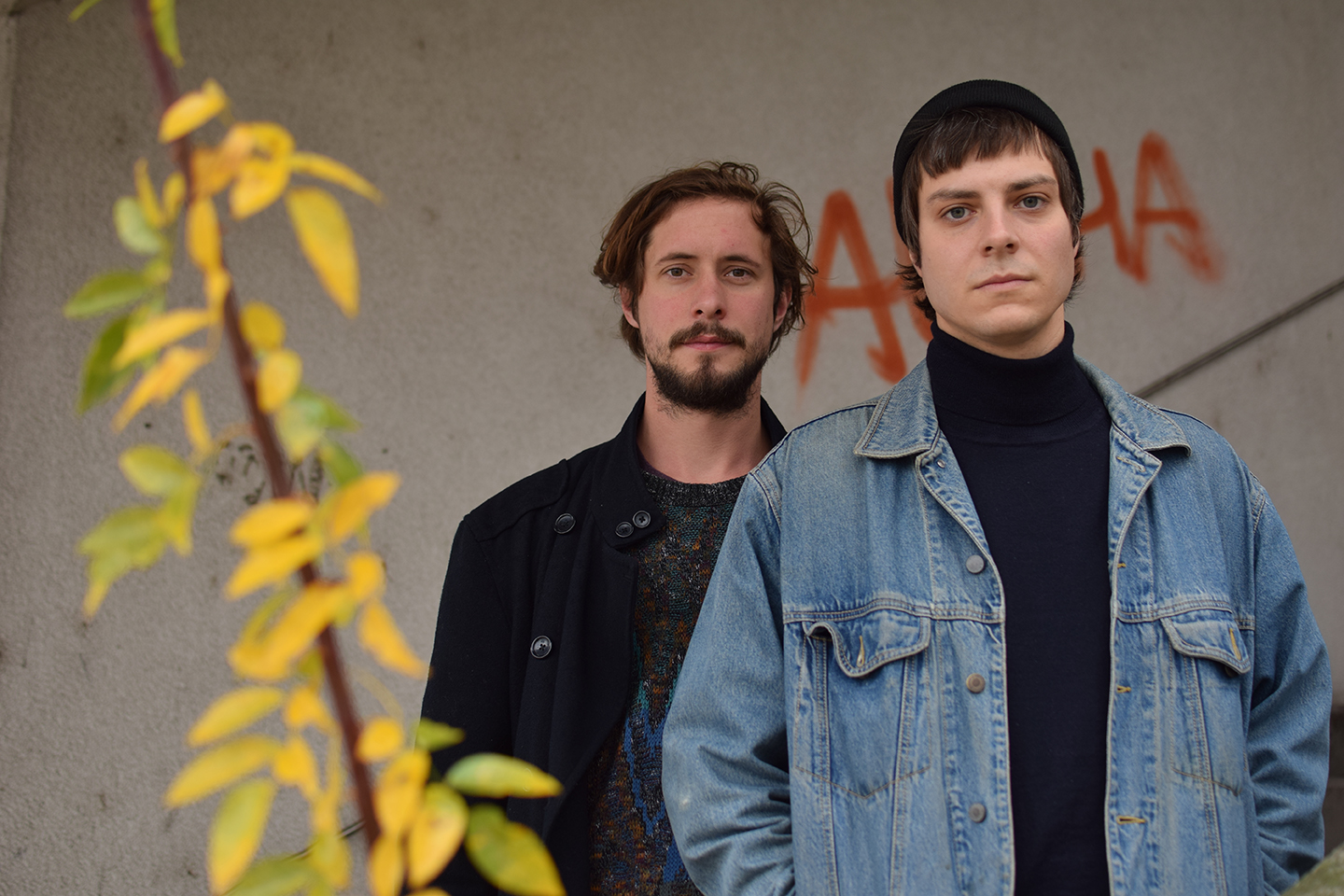"The hardest thing to do is something that is close…

To say the year 2016 was turbulent would be an understatement. And most of its consequences remain yet to be seen: Donald Trump won the presidential elections in the United States and faces the challenge to unite a fragmented country. In Europe, Great Britain is still looking for its way out of the European Union – with PM Theresa May’s plans mainly unknown or predictable. The same conclusion can be drawn concerning the situation in the Middle East, were signs for hope and peace are sparse. When asked about contemporary world politics, author/poet/rapper Saul Williams is repeating one particular phrase a lot during our interview: “We are living in interesting times”. But he isn’t just using this phrase to describe all the negative events that are currently happening. He also uses it to address positive effects like the opportunities provided to us by the Internet – a topic that plays a pivotal role on his latest album, “MartyrLoserKing”, which tells the story of a Burundian hacker.
The Message: You lived in Paris for a while. How did living abroad affect your views on US politics?
Saul Williams: Living abroad doesn’t mean a change of your perspective. It informs and enhances it. US politics right now feel the same way inside America like they do outside of America. Everybody knows what’s going on. The rise of the conservative, nationalistic and far-right has been happening across Europe and it’s nothing new. But to see that happening in America, it seems to be a shock to everyone. To those of us, who have been there, it is not something unknown. In many countries, it is the same fear: Brexit, Marine Le Pen, what’s happening in Greece, Turkey. There’s something going on globally right now and America is just obviously a part of it. On top of that, because of the dialogue forming in America around “Black Lives Matter”, around white privilege and white supremacy, it is forcing us to acknowledge the role America has played in its own sense of elitism. The role that America has played in foreign territories has been horrendous over the years. In terms of meddling in Middle Eastern politics and allying themselves with all sorts of groups for the sake of the imperialistic claim on territory and oil. It isn’t to say that everyone in America is 100% informed, also not everyone around the world is. Over the years, I found out that people outside of America were way more clear on what is happening in American politics than people inside America. Now I feel that in America, there is a growing sense of awareness. There’s also a growing sense of insurgence, in form of a rising nationalistic, pseudo patriotic, ignorant front. That comes from the lack of money that America invests in education. 62% of our budget goes to our defense. Everything else is less than that. But it isn’t only an issue of money! At this point, we even have to look at what we are teaching. In our school system you find a very Eurocentric, American-based perspective on the planet. It’s absurd that people in America, for example, don’t learn anything about Native American culture! As we evolve as humans, we realize their importance. Because the Native Americans are there! They aren’t dead, although many were killed. To the contrary, there is a huge population and political movement right now. Nevertheless, Americans don’t learn about that. So putting more money in our education system wouldn’t be enough. Restructuring is needed. Thankfully, there is a new generation that is less tolerant to bullshit. I have two kids in school, and both call me angry after school every day (laughs).
Because these people voting for Trump would vote for Bernie
You are known as a supporter of Bernie Sanders. How did you feel when Sanders declared his support for Hillary Clinton?
That’s just strategy. Although it was heart-breaking. We did not need Wikileaks to know that the establishment is against Bernie Sanders. That everybody is against him – except his supporters. In the end, Wikileaks failed us. Because they should have come out with that information (Hillary Clinton’s emails, A/N) before. When we needed it for the primaries. That’s the only issue. We know her involvement with banks – and we know that we were winning. But they didn’t want that. If we would have had that information, Bernie had won the primaries. And we would have a different conversation. Because these people voting for Trump would vote for Bernie. Bernie was an interesting middle ground. He had the sense of “Make America Great Again” too. He had some of the same rhetoric – without the racism.
Bernie Sanders calls himself a “Democratic Socialist”.
He just wants the things that are normal in Europe! For those who are travelling in Europe, we experience and appreciate that. I think the American people deserve the experience – to get sick and to not have to worry about money. Just about health. Or, another example: That all parents can afford to send their children to university. I would like to see how that affects American culture. Of course, there are pros and cons when you want to go deep in it. In France, art is getting a lot of money from the government. That creates a different caliber. So, it just depends on what the people want. If they want the social democracy, we will have it.
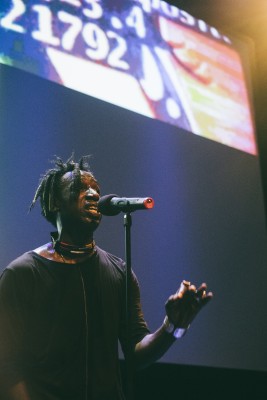 In the academic world there is a discussion about the importance of democracy for the economic development of a country. Some scholars argue that economic development should be prioritized over democracy – a point of view that was also often heard during the Oromo protests in Ethiopia. Do you agree with them to some extent?
In the academic world there is a discussion about the importance of democracy for the economic development of a country. Some scholars argue that economic development should be prioritized over democracy – a point of view that was also often heard during the Oromo protests in Ethiopia. Do you agree with them to some extent?
(takes a deep breath) To be for democracy doesn’t mean that you are anti-business. We are talking about development in terms of business, like Ethiopia has built their train system to Djibouti. Under the big influence of China …
Even the construction workers were from China.
Yeah, and that’s so crazy (laughs). When you think about the Oromo who lived there for thousands of years and now they are losing their farmland – and I have met some Ethiopian refugees with Oromo ethnicity – I can not agree with that idea. Development should lead climate change, energy transfer – away from oil to solar – and if a nation was truly interested in development, it won’t go the analogue way of exploiting people and land. The truly technological development that we are heading for would not need to interfere in the same way. I don’t believe in the development rhetoric that is promising progress. Of course, countries like Rwanda and Ethiopia are in competition. They need development. But there are ways of doing that without displacing millions of people. So, NO: Development is not more important than democracy. Hell no! Develop democracy – that is what we need. With social media, we are developing democracy. We’re taking it to a new level. It’s true that our thoughts move faster than corporations.
That was probably the main reason why the EPRDF (Ethiopian People’s Revolutionary Democratic Front, A/N) responded to the Oromo protests by banning the Internet.
Exactly. The same thing is happening in Turkey and China. We have our own censorship in the States too. It’s called entertainment (laughs). You just have to keep the people self-consumed: Here’s a new show, there’s a new event, here’s the new season of this show, there’s the new season of that show … and this all works.
But with Trump winning, I would say yes, America is a failed state
What is your opinion on the proposal that the Internet and global connectivity should play a much bigger role in contemporary development aid?
The importance of the Internet is clear when you look at places like Mogadishu. Where they ran out of cash currency and now, they are paying with their mobile phones on the market (Bakaara Market, A/N). I love it! Our progress in the industrial or developed world is: we invested so much in oil, we invested so much in telephone lines, we invested so much in the existing infrastructure that the modern ideas won’t take home. Because those companies are spending so much money to avoid change. For example, the tobacco industry is putting everything in to make sure that weed stays illegal in America. It’s the same with the oil industry. The first cars were electric and bio-diesel. The first cars in 1910! So you can’t tell me that the technology doesn’t exist. It’s the pressure of the oil companies that is slowing down progress. When I lived in Brazil in the eighties, the majority of the cars there ran on ethanol made by sugarcane. In the eighties! Then the big oil companies put pressure on the government and made sure that the new technology – or, in this case, the old technology – stays out of the picture. That’s the same case with Monsanto in agriculture. On every level, you have these existing paradigms that are based on analogue exploitation. You’re not gonna believe it: America is self-sufficient on oil right now. It’s surprising that this isn’t all over the media. Fracking is the keyword. And that’s the reason why the oil price is so low. But we should be self-dependent on wind and solar – and not on this old system. So, we have to develop democracy. There is no contradiction between democracy and business. There is only contradiction when you get into the exploitative meanings of business, like the most radical forms of free market. What is important for America is to realize that they have to play fair. I’m talking about one of the most diverse countries in the world – and that’s wonderful. But you have to know how to feed that diversity, to develop that diversity, how to invite more diversity – that’s how places thrive. That’s how you can develop democracy and business simultaneously. Our greatest business inventions in the past twenty-five years have all come from immigrants and children of immigrants. Like Steve Jobs. Immigrants are the secret of the success. Imported labour (laughs).
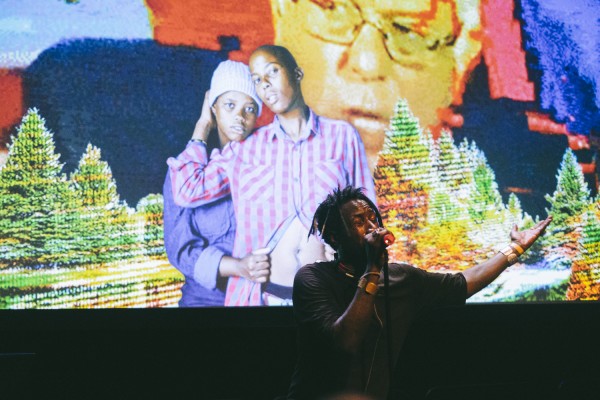
Noam Chomsky once declared the United States a “failed state” and a danger for its own people. What’s your perspective on Chomsky’s interpretation of the US?
On the one hand, he’s right. It’s failed, in many ways. You have to look at the prison system, supremacist policies, gender-laws – and the slow, slow progress that is coming over time. On the other hand, America isn’t fixed. It doesn’t stop today. There is always the potential for a change of things. But with Trump winning, I would say yes, America is a failed state (laughs).
The first video single off your last album “MartyrLoserKing” was “Burundi”, a track that came out when the upheaval in Burundi started. How did you feel when you heard about the events in Burundi?
That was crazy. I wrote the song about two years ago, and it was just crazy to see these events showing up in the media. Because of my wife who is from Rwanda I get a lot of information from the Great Lake Region. And there was Rwanda’s president Kagame and his run for a third presidential term …
Paul Kagame and Paul Biya, the president of Cameroon, were something like the role models for Pierre Nkurunziza’s decision to do the same.
Nkurunziza is a dangerous man. It’s bizarre. At the same time, as someone who worked in arts and poetry for many years, I was not surprised. That’s the sort of synergy that you come to expect. Now, it’s scary. But I promise I won’t write about Austria (laughs).
The temptation is to blame the media. But I also blame people
What role do you think the media plays in the political development of a country?
The media is playing an important role – but not the role that it thinks it is playing. That’s the problem. They are challenged by technology. And we can’t force their balance in perspective: the fact that so many media conglomerates are owned by corporations with a right-wing or left-wing angle – and we are talking about popular media – also adds to the imbalance. And then we have whistle-blowers like Chelsea Manning who are doing essentially what the media was famous for … in the seventies (laughs). This also changed with the Internet. Now, you have the 24-hour-timeline. It enforces you. For example, when you look at the left-wing media in the States right now, something like Huffington Post: they have twenty articles in a row on Trump. And they are all anti-Trump. But it’s all about Trump. And every news is good news. And every press is good press. That’s the weird over-exaggeration in the media. The temptation is to blame the media. But I also blame people. Because we curate our timelines. We choose on Twitter who we want to follow. So, we follow who we like and we are living in our bubbles. Because you are just looking for things that confirm what you are thinking, not what informs you.
In an interview with the German newspaper Sueddeutsche Zeitung, M.I.A. said that the most negative thing about the Internet is that the dumb and loud people have the same right to express their opinions like the smart one’s. Can you understand her sentiment?
I know what she means. I love M.I.A. She has a song where she sings: “Say life’s like a box of chocolates. We say who packed it” (“Foreign Friend”, A/N) So great! (laughs) In fact, “MartyrLoserKing” was inspired by M.I.A. – the reason why it takes place in Burundi is inspired partly by her. Because she has a song which goes “I put people on a map that never seen a map” (“$20”, A/N). So it made me want to focus on Burundi – we don’t know much about Burundi. What is interesting about me: I’m from a small city out of New York called Newburgh. A very violent, crazy city nobody has ever heard of. And to me, I am linking New York to Newburgh and Burundi to Rwanda. Burundi and Rwanda have the same regional backgrounds, but things started to play out a little differently. It’s the same case between Newburgh and New York. Just like New York for the people of Newburgh, Burundi has also something magical for the Rwandans. Because of the beautiful women, the food, the nightlife. For the previous generation, like my wife’s mother who died in the genocide, Bujumbura was the region’s Paris. It was. That’s why it is so crazy what is going on there right now.
In America, you have to find a way to make reading books sexy
Kigali seems to become the new Paris of the Great Lake Region.
Yes – and Kigali becomes it because of the Burundian refugees. But it was always Bujumbura that had this status. To come back to M.I.A’s statement: when you are going on Twitter or any social media platform, it is true that a headline has the same weight as a meme. A stupid meme from an ignorant, racist person comes up in your timeline and is just next to headlines about democracy and the situation in Palestine. So, there’s truth in it. But there’s no consequence in what she’s saying. There’s a difference in how we distinguish between the qualities of voices. It’s the same concept as with music. We are getting so much bullshit. What excites me – and I think her too – is a more intellectual culture. In America, you have to find a way to make reading books sexy. Maybe with a campaign featuring a naked Brazilian woman reading a book. The same thing like they did with milk (laughs).
“MartyrLoserKing” has a similar concept like “Year Zero” by Nine Inch Nails. Was Nine Inch Nails an inspiration for the album?
I’m very inspired by Trent (Reznor, A/N). What’s funny because “Year Zero” shares some of the inspiration from “Niggy Tardust”. I worked with Trent on “Year Zero”, I know that some of the inspiration was connected to that. Of course, it’s the next level. There’s a graphic novel coming about “MartyrLoserKing”. And two more albums. I’m actually in Rwanda in January and February where I start scouting for the film. The record is just the beginning of the project. Just the first layer.
“Burundi” features a passage from a famous Sufi poem. What is your connection to Sufi poetry?
It’s the most beautiful poetry that I have encountered. People are handing me books all the time. I remember having received two very specific books at two different times. One was at CBGB’s, performing there, and it was the day before I was leaving for performing in Istanbul in 1998. Someone handed me “The Essential Rumi”. I heard about Rumi, but I had never read it. Then I read Rumi and was landing in Turkey with the realization that he was from there. Back in the States, I met Rick Rubin. And he handed me a book called “The Gift” which is by Hāfez – the other Sufi poet I love. Before that, I thought I love Rumi. But then I read Hāfez. Rumi is 15th century, Hāfez is 14th century and even more far-out. I think it is an interesting time to talk about Sufism. Because there is so much Islamophobia going around – and it’s interesting for people to learn about the wonderful Sufi that have existed. I’ve also been inspired by the Sufism practiced in Senegal. It’s really inspiring. As a result, my collection of Rumi, Hāfez and Laozi have been one of the most helpful books that helped me to deconstruct my relationship to Christianity, which I was raised in, and to understand the broader sense of relationship to spirit devoid religious ideology. What I find interesting about Sufi is that they don’t pray five times a day. They don’t give a fuck or a reference to what the Iman is saying. Hāfez has this wonderful poem where he is like “God, you really have to stop standing on the table and lifting your skirt like that/Cause I’m not gonna stop looking” (laughs). There is this beautiful relationship to humanity. And then Rumi: “I’m a candle/Chop my neck a million times, I still burn bright and stand“. And another one where he says: “Tie all the intellects of the planet together, they still won’t reach me” (laughs). What Sufi poetry simply did: it taught me the greatest and highest purpose of poetry itself.
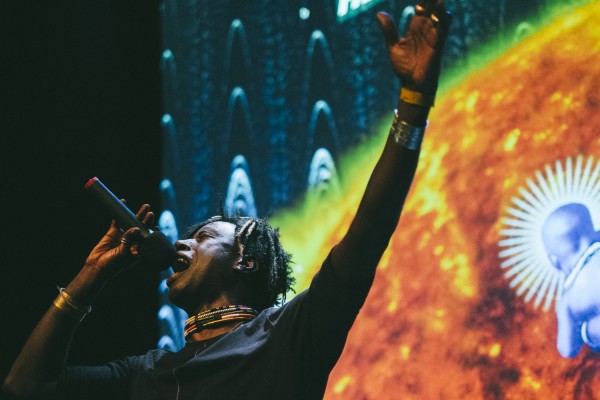
Additional photos by Niko Havranek
Ähnliche Posts
- "You have to challenge the society" // Jahson The Scientist Interview
Jahson The Scientist ist ein "Wordsman", der in seinen Ausdrucksformen keine Grenzen kennt. Er ist…
- The Story of a Long Lost Relative // DJ Werd Interview
DJ Werd ist seit Jahren eine Art "graue Eminenz" im deutschen HipHop-Geschehen. Aufgewachsen in San Jose,…
- "We gotta fuck the system up" // Mick Jenkins Interview
Kurz vor seinem Wien-Auftritt in der Grellen Forelle nimmt sich Mick Jenkins, der bei seiner…



